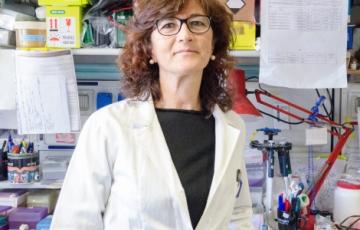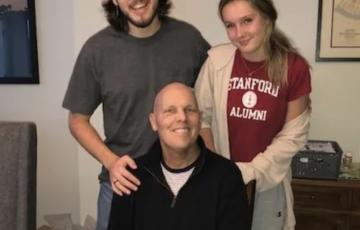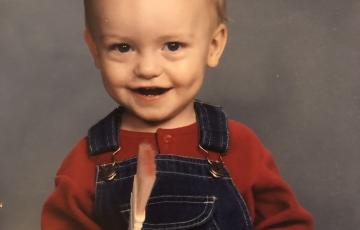Search Results
Relapsed and Refractory
Some patients' cancer returns after a successful course of treatment. This is called a relapse.
Some patients' cancer does not respond to treatment. This is called refractory chronic myelomonocytic leukemia (CMML).
If you have relapsed or refractory CMML, talk with your doctor about whether taking part in a clinical trial may be a good option for you.
Childhood and Adolescent Blood Cancer Facts and Statistics
Childhood and Adolescent Blood Cancers- An estimated 54,868 children and adolescents younger than 20 years in the US are living with or in remission from leukemia, lymphoma, myeloma, myelodysplastic syndromes (MDS) or myeloproliferative neoplasms (MPNs).
- Leukemia is the most common cancer diagnosed in children and adolescents younger than 20 years and accounts for 25.4 percent of all cancer cases in this age-group.
- From 2016 to 2020, the most recent 5 years for which data are available, leukemia and lymphoma accounted for 38.4 percent of all cancer types in

Giulia Casorati, Ph.D.
A Leading Researcher Advancing Immunotherapy for Acute Myeloid Leukemia
In Italy, Dr. Giulia Casorati is focused on adoptive cell immunotherapy to treat patients with acute myeloid leukemia (AML). Immunotherapy is a groundbreaking approach to treatment that involves harnessing the power of the patient’s own immune system to kill cancer. She is developing an immunotherapy approach that engineers T cells to specifically target CD1, a molecule found on the surface of AML cells.
Relapsed and Refractory
Some patients still have leukemia cells in their bone marrow after hairy cell leukemia treatment. This is called refractory leukemia. Some patients have a return of leukemia cells in the marrow and a decrease in normal blood cells after remission. This is called a relapse.
Drug therapy that can be used to treat relapsed or refractory HCL includes:
Childhood AML
Childhood Acute Myeloid Leukemia (AML)Because of new and better therapies, cancer survival rates for children with acute myeloid leukemia (AML) have improved dramatically during the last several decades. Scientists continue to search for the causes of childhood leukemia so they can develop better treatments with less toxic side effects.
Find statistics for Childhood AML and other blood cancers.

Margot
I lost my father at age 53 to acute myeloid leukemia (AML) after a hard 13-month battle. I want to get involved with The Leukemia & Lymphoma Society (LLS) to spread awareness around leukemia and other blood cancers, to hopefully help other patients and loved ones going through this. My brother, Jack Austin, has run 2 marathons under the team "Running for Rob" and has fundraised over $10K for LLS. I want to get involved and fundraise to not only spread awareness and support to those dealing with this dreadful disease.
Diagnosis
Diagnosing acute lymphoblastic leukemia (ALL) and the ALL subtype usually involves a series of tests. An accurate diagnosis of the subtype is important. The exact diagnosis helps the doctor
- Estimate how the disease will progress
- Determine the appropriate treatment
In children, a diagnosis of ALL generally requires a finding that 25 percent or more of the cells in the bone marrow are leukemic blasts of lymphoid origin (lymphoblasts).
Clinical Trials
Taking part in a clinical trial may be a good treatment choice for people with chronic myelomonocytic leukemia (CMML). Clinical trials are under way to help improve treatment, extend survival and improve the quality of life for CMML patients. Today's standard treatments for cancer are based on earlier clinical trials. The Leukemia & Lymphoma Society continues to invest funds in CMML research.
Treatment Outcomes
Treatment results and outcomes vary among patients. The advent of the chemotherapy drug cladribine (Leustatin®) has resulted in approximately an 85 percent rate of complete remission (no evidence of the disease) and approximately 10 percent rate of partial response.
Many patients remain disease free for years or decades after treatment with cladribine or pentostatin (Nipent®) and have a normal life expectancy.

Monica
Our daughter, Monica, is a busy mother of three sweet girls, age 12 months, 3 years and 6 years. After a long winter filled with the girls’ colds, infections, and flu, Monica was exhausted.
ALL Subtypes
Doctors classify acute lymphoblastic leukemia (ALL) into subtypes by using various tests. It's important to get an accurate diagnosis since your subtype plays a large part in deciding the type of treatment you'll receive. Depending on your ALL subtype, the doctor will determine
Clinical Trials
Taking part in a clinical trial may be the best treatment choice for some acute myeloid leukemia (AML) patients. Clinical trials are under way for patients at every treatment stage and for patients in remission. Today's standard treatments for cancer are based on earlier clinical trials. The Leukemia & Lymphoma Society continues to invest funds in AML research.
Click here to read more about clinical trials.
Clinical Trials
Taking part in a clinical trial may be the best treatment choice for some chronic lymphocytic leukemia (CLL) patients. Clinical trials are under way to improve remission rates for CLL. Today's standard treatments for cancer are based on earlier clinical trials. The Leukemia & Lymphoma Society continues to invest funds in CLL research.
Click here to read more about clinical trials.
Graham
I am joining former England and Crystal Palace footballer and leukemia survivor, Geoff Thomas, and 23 other teammates to cycle the full Tour de France route one week ahead of the professionals to raise funds for the UK charity Cure Leukaemia. It's three huge goals — riding the Tour de France, raising $40,000 myself, and the team’s goal of $1 million. But with The Leukemia & Lymphoma Society’s (LLS) help, I know I can achieve it.

Tom
Hello Friends — this is my leukemia journey, For those of you who don’t know me, my entire 38-year teaching career was spent with 9-12 year olds. I’ve always relished the authenticity and passion of this age group and that led me to a very satisfying and rewarding chapter in my life.

Makenzie
My daughter Makenzie was diagnosed with chronic myeloid leukemia (CML) in January 2013, when she was just four years old. She had no signs or symptoms of leukemia. One day, Makenzie had a sore throat and we made an appointment with her pediatrician. Turns out she did have strep throat, but an exam also revealed her spleen was very enlarged. At that point, her pediatrician did bloodwork and learned that Makenzie's white cell count was through the roof. We were sent to Texas Children’s Hospital where later that evening she was diagnosed with CML.

Betty
In 2013, after doing the 60 mile, three day walk in support of breast cancer, of which I am also a survivor of, I realized that something seemed wrong as the walk was extremely difficult for me, unlike the previous 5 walks I had done. I made an appointment to see my doctor that next week and after doing some tests, I was told I had acute myloid leukemia. I was told I needed to check into the University of MN hospital that same day. And so began my journey with acute myeloid leukemia (AML).

Tina
My son Evan was diagnosed with acute lymphoblastic leukemia (ALL) when he was two years and seven months old. He went into remission a month later. He finished his chemotherapy and treatment, but shortly after he relapsed. He went through radiation and chemotherapy again and was given a bone marrow transplant. He never made it out of the hospital and passed away when he was four and a half. The reason I fundraise for The Leukemia & Lymphoma Society (LLS) is so other parents won’t have to go through what we went through.
Clinical Trials
Taking part in a clinical trial may be the best treatment choice for some acute lymphoblastic leukemia (ALL) patients. Clinical trials are under way for patients at every treatment stage and for patients in remission. Today's standard treatments for cancer are based on earlier clinical trials. The Leukemia & Lymphoma Society continues to invest funds in ALL research.
Click here to read more about clinical trials.
Clinical Trials
Taking part in a clinical trial may be the best option for some chronic myeloid leukemia (CML) patients. Clinical trials are designed to be accurate and very safe. There are clinical trials for newly diagnosed patients, for patients with advanced disease, and for patients who are either intolerant to or resistant to their current medications. The Leukemia & Lymphoma Society continues to invest funds in CML research.
Click here to read more about clinical trials.
Chemotherapy
If you're being treated for hairy cell leukemia, your first line of defense will likely be chemotherapy. During chemotherapy, you'll be given potent drugs that must be toxic enough to damage or kill leukemic cells. At the same time, they can take aim at normal cells and cause side effects. Yet, not everyone experiences side effects and people react differently.
The chemotherapy drug used to treat hairy cell leukemia is cladribine (Leustatin®). Cladribine is given in a vein (intravenously). You'll usually receive the treatment for seven consecutive days.

Jayne & Jenny
My sister Jenny and I both have chronic lymphocytic leukemia (CLL), and I was doing the Facebook challenge, “50 Miles in November,” for The Leukemia & Lymphoma Society (LLS) in honor of us.
ALL Subtypes
The subtypes of ALL are identified based on certain features of the leukemia cells. Determining the ALL subtype is an important factor in treatment planning. The doctor will discuss with you which drug combinations are indicated based on your child’s ALL subtype.
Leukemia cells can be classified by the unique set of proteins found on their surface. These unique sets of proteins are known as “immunophenotypes.” Based on immunophenotyping of the leukemia cell, the World Health Organization (WHO) classifies ALL into two main subtypes.
Treatment Outcomes
All patients are advised to discuss survival information with their hematologist-oncologists. Keep in mind that outcome data can only show how other people with CMML responded to treatment, and cannot predict how any one person will respond.
Unfortunately, lasting remissions are not common. The expected survival time ranges from a few months to a few years after the initiation of treatment, depending on a variety of risk factors including the percentage of blasts in the blood and marrow, the white blood cell count, and the presence of certain gene mutations.